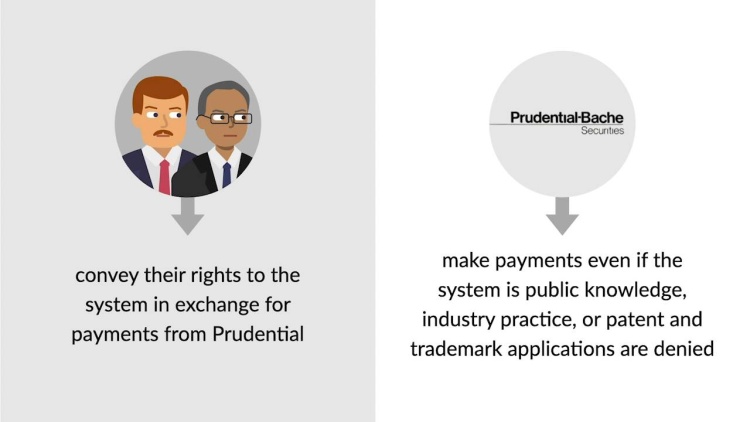Apfel v. Prudential-Bache Securities, Inc.
New York Court of Appeals
616 N.E.2d 1095, 81 N.Y.2d 470 (1993)
- Written by Megan Petersen, JD
Facts
Prudential-Bache Securities, Inc. (Prudential) (defendant) is an investment bank. In 1982, Apfel (plaintiff) and his partner, an investment banker and a lawyer, presented Prudential with a proposal to create a computerized system for issuing municipal securities which would completely eliminate paper certificates. Prudential reviewed the proposal and negotiated with Apfel for one month before entering into a contract of sale. Apfel sold the idea to Prudential in exchange for Prudential agreeing to pay a certain rate based on its use of the idea from October 1982 to January 1988. The contract also stipulated that Prudential was still obligated to make payments to Apfel even if the idea became public knowledge or standard industry practice, or if Prudential’s applications for patents and trademarks for the idea were denied. The parties signed the agreement, and Prudential implemented the contract from 1982 to 1985. For much of this time, Prudential was the only investment bank using a computerized system, and conducted millions of transactions using this technology. By 1985, however, several other investment banks began using similar systems. In 1985, after a personnel change, Prudential refused to make any more payments under its contract with Apfel. Prudential stated its belief that the idea presented by Apfel had been in the public domain at the time it was presented to Prudential, and thus was not novel. Additionally, Prudential failed to obtain patents and trademarks on the idea. Apfel and his partner brought suit against Prudential in the New York Supreme Court seeking $45 million in compensatory and punitive damages for multiple causes of action, including breach of contract. Prudential presented multiple counterclaims, including breach of contract and lack of consideration. Both parties sought summary judgment. The trial court denied the motions for summary judgment, and dismissed all causes of action except for breach of contract. Both parties appealed, and the Appellate Division reinstated Prudential’s claim for lack of consideration. It held that novelty was required for consideration based on the sale of an idea, but held that whether novelty was present was a question for trial. Prudential appealed, arguing principally that no contract existed with Apfel due to lack of consideration.
Rule of Law
Issue
Holding and Reasoning (Simons, J.)
What to do next…
Here's why 907,000 law students have relied on our case briefs:
- Written by law professors and practitioners, not other law students. 47,100 briefs, keyed to 996 casebooks. Top-notch customer support.
- The right amount of information, includes the facts, issues, rule of law, holding and reasoning, and any concurrences and dissents.
- Access in your classes, works on your mobile and tablet. Massive library of related video lessons and high quality multiple-choice questions.
- Easy to use, uniform format for every case brief. Written in plain English, not in legalese. Our briefs summarize and simplify; they don’t just repeat the court’s language.





